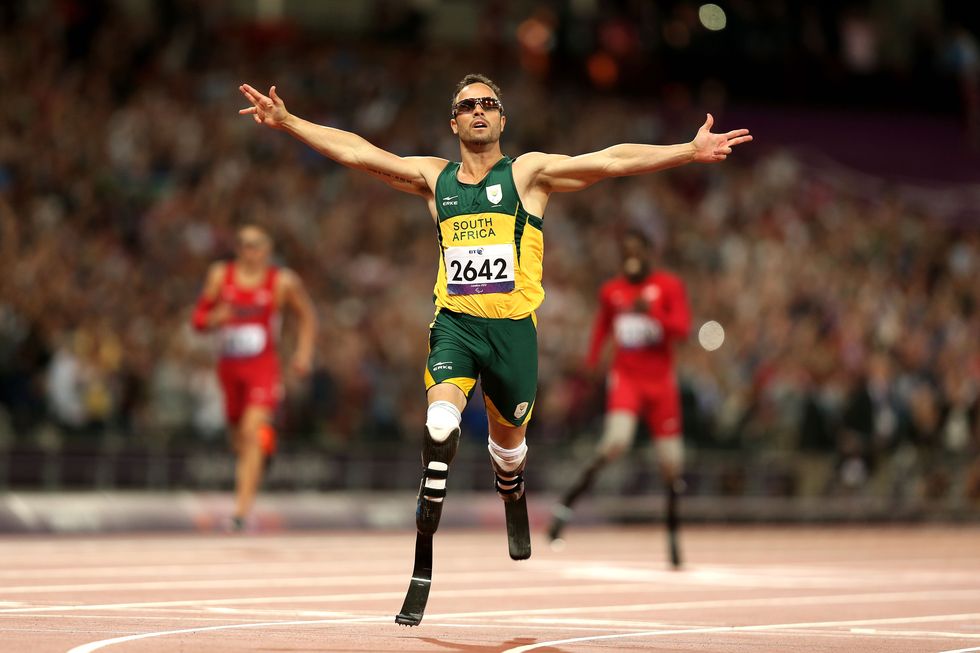You are viewing the article Oscar Pistorius: The Rise and Fall of the Olympian Turned Killer at Tnhelearning.edu.vn you can quickly access the necessary information in the table of contents of the article below.

By the summer of 2012, few public figures were more widely admired than South African sprinter Oscar Pistorius.
The “Blade Runner” had captured the world’s attention by becoming the first double-amputee to compete against able-bodied runners in the Summer Olympics, his show of speed on a set of J-shaped prostheses providing undeniable proof of how the human will could triumph over adversity.
And while the story of his ascent was stunning, so too was the news that he had killed his girlfriend Reeva Steenkamp the following February, setting up a fall from grace that one South African judge would later deem a “human tragedy of Shakespearean proportions.”
Pistorius enjoyed an active childhood despite his physical limitations
As described in his 2008 autobiography, Blade Runner, Pistorius was born in November 1986 with no fibula in either leg and deformed feet, prompting parents Henke and Sheila to make the difficult decision to have his legs amputated below the knee at 11 months old.
The perceived handicap to some was hardly a hindrance to the energetic toddler, who eagerly took to his first pair of prosthetic legs at 17 months. Spurred by parents who refused to accept excuses – “My brother, my sister and I were brought up with one iron rule – no one was allowed to say ‘I can’t,’” he wrote – Pistorius plunged himself into activities like hiking, bike riding, wrestling and water-skiing.
Not that his childhood was devoid of difficulties – Henke and Sheila divorced when Pistorius was 6 years old, and he was 15 when his beloved mother died from an allergic reaction to medication.
Pistorius also suffered a serious knee injury at 16 while playing rugby, but this setback came with a sparkly silver lining, as doctors suggested he take up running as part of his rehabilitation.
He was accused of having an unfair advantage and banned from competing
In January 2004, mere weeks after he began seriously training, Pistorius breezed past the Paralympic world record in the 100-meter dash. That June, he was fitted with his first set of carbon-fiber “Flex-Foot Cheetah” blades, on which he blazed to a world-record mark in the 200 meters at the Paralympics in September.
Pistorius’ relentless ambition then carried him to competitions against able-bodied runners, a quest that amazed fans but also invited scrutiny from those who wondered whether he was getting an unfair boost from his artificial extremities.
In January 2008, following a series of tests, the International Association of Athletics Federations announced that Pistorius was indeed benefitting from his racing prostheses and banned him from all sanctioned events. Fortunately, the ruling was soon overturned on appeal to the Court of Arbitration for Sport, which agreed that any advantages gained by runner on the lightweight blades were offset by the difficulties they presented on the starting block and curved sections of the track.
The restored eligibility wasn’t enough to help Pistorius meet his stated goal of qualifying for South Africa’s 2008 Olympic track team, though he made a splash at the Paralympics later that summer by claiming gold medals in the 100-, 200- and 400-meter races.
Pistorius’ inspirational story masked personal troubles
Over the next few years, Pistorius’ international celebrity was cemented thanks to features in leading publications like Time, GQ and People, though a few behind-the-scenes incidents suggested that trouble was lurking below the surface.
A February 2009 speedboat crash, for example, may have been the result of the empty alcohol bottles reportedly found onboard. That September, the star sprinter was arrested for injuring a woman after allegedly slamming a door on her at a party.
Still, the headlines that accompanied his exploits were largely inspirational. In September 2011, Pistorius joined his able-bodied 4×100-meter relay teammates to become the first Paralympian to earn a medal at the World Championships. The following summer brought his crowning moment at the London Games, followed by two more golds at the Paralympics.
The Olympic halo was still glowing in January 2013 when Pistorius, at a Johannesburg restaurant with friends, accidentally discharged a gun beneath the table. Among his companions that day was Steenkamp, his model girlfriend of two months who was preparing her own leap to fame on a reality TV competition.
Pistorius initially received a light sentence for culpable homicide
A few weeks later, in the early morning hours of Valentine’s Day 2013, the high life for Pistorius came crashing down when he fired four gunshots at the locked bathroom door of his home in Pretoria, killing his girlfriend inside.
The highly-publicized trial began in March 2014 with a neighbor’s testimony of hearing Pistorius and Steenkamp screaming at each other, followed by the shots. In his defense, the Paralympian claimed he fired at the bathroom door in the belief that an intruder was lurking inside, only to belatedly realize it was his lover.
Although the once-saintly image of Pistorius had since been eclipsed by accounts of him being violent and controlling, it seemed he would be spared the worst punishment by a sympathetic court. Judge Thokozile Matilda Masipa chided him for his negligence with a firearm but ultimately found him guilty of culpable homicide – roughly equivalent to manslaughter – and sentenced him to five years behind bars in October 2014.
Even when the conviction was overturned by the Supreme Court of Appeal in December 2015 and Pistorius faced an upgraded charge of murder, Judge Masipa ignored the standard 15-year minimum and handed out a six-year sentence in July 2016.
It took the stern hand of South Africa’s top appeals court to once again intervene and extend Pistoruis’ “shockingly lenient” sentence to 13 years and five months in November 2017. And when his own appeal was denied the following April, there was nowhere else to go for the man who once ignored his own severe limitations to scale such impossible heights.
Watch Oscar Pistorius: Blade Runner Killer on Lifetime Movie Club
Thank you for reading this post Oscar Pistorius: The Rise and Fall of the Olympian Turned Killer at Tnhelearning.edu.vn You can comment, see more related articles below and hope to help you with interesting information.
Related Search:





